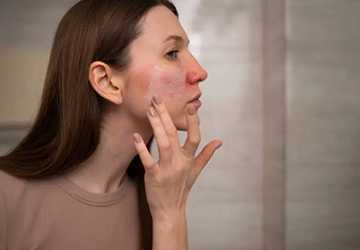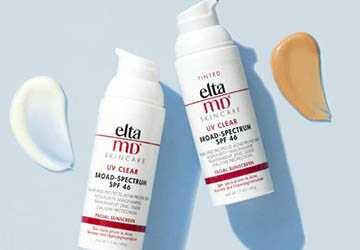Dealing with the complexities of rosacea can be difficult, but choosing the right skincare products can provide significant relief from the condition. In this article, we'll explore the best skincare routine for rosacea and offer strategies for effectively treating rosacea. In addition, we'll highlight gentle products for sensitive skin that can help soothe and relieve irritation.

Understanding Rosacea
Rosacea is a persistent skin condition that causes redness, inflammation, and occasionally an acne-like rash on the face. It primarily affects the cheeks, nose, forehead, and chin. Although the exact cause of rosacea is unknown, many factors, including genetics, environmental irritants, and a compromised skin barrier, can trigger a worsening condition.
Main Symptoms of Rosacea
- Persistent redness on the face
- Inflamed papules and pustules
- Prominent telangiectasia
- Burning or stinging sensations
- Dryness and rough skin texture
Skin Care for Rosacea Is Imperative
Choosing the right rosacea skin care is essential to effectively treating rosacea. The wrong products can worsen symptoms, while the right products can help prevent them from worsening. Here are some tips to keep in mind when choosing gentle products for sensitive skin:
Tips for choosing skin care products
1. Avoid irritating ingredients: Compounds like ethanol, fragrance, and menthol can irritate the skin and worsen rosacea symptoms. Opt for fragrance-free and hypoallergenic formulas.
2. Look for soothing ingredients: Aloe, chamomile, and camellia contain anti-inflammatory properties that can soothe irritated skin.
3. Use sunscreen daily: UV radiation is a common cause of rosacea. Opt for a broad-spectrum sunscreen with an SPF of at least 30 for sensitive skin.
4. Moisturize regularly: Staying hydrated is essential. A gentle, non-comedogenic moisturizer prevents dryness and strengthens the skin barrier.
Best Skin Care for Rosacea
Continuous, gentle skin care can make a big difference in rosacea treatment. Here is a recommended skincare routine for rosacea:
Morning Care
1. Cleanser: A gentle, sulfate-free cleanser removes impurities without skin drying.
2. Toner: Use an alcohol-free toner with soothing ingredients like witch hazel or rose water.
3. Serum: Choose a serum with niacinamide or hyaluronic acid to hydrate the skin and soothe redness.
4. Moisturizer: Choose a lightweight, fragrance-free moisturizer to lock in moisture.
5. Sunscreen: Apply a mineral sunscreen with zinc oxide or titanium dioxide.
Night Care
1. Cleanser: Use the same gentle cleanser for your morning routine.
2. Toner: Reapply an alcohol-free toner.
3. Treatment: If your dermatologist prescribes, use a topical treatment for rosacea.
4. Moisturizer: Apply a richer moisturizer to provide extra moisture at night.
Recommend Gentle Products for Sensitive Skin
When treating rosacea, choosing gentle products for sensitive skin is crucial. Here are some key recommendations:
Cleansing Products
- Cetaphil Gentle Cleanser: A gentle, non-irritating formula perfect for daily use.
- La Roche-Posay Toleriane Hydrating Gentle Cleanser: Contains Niacinamide and Ceramides to soothe and repair the skin barrier.
Toners
- Thayers Alcohol-Free Rose Petal Witch Hazel Toner: Contains witch hazel and rose water to soothe and refresh skin.
- Paula's Choice Intensive Calming Toner: Rich in antioxidants and anti-irritants to soothe erythema and inflammation.
Serums
- The Ordinary Niacinamide 10% + Zinc 1%: Helps balance sebum production and reduce erythema.
- Vichy Mineral 89 Hyaluronic Acid Serum: Provides intensive hydration and strengthens the skin barrier.
Moisturizers
- Eucerin Redness Relief Night Cream: Contains Licorice Root Extract to soothe and relieve erythema.
- Avene Antirougeurs Fort Relief Concentrate: Specially formulated to reduce the appearance of erythema and improve skin comfort.
Sunscreen
- EltaMD UV Clear Broad Spectrum SPF 46: This sunscreen is formulated for sensitive skin to help soothe and protect.

- Blue Lizard Australian Sensitive Sunscreen SPF 30+: It is chemical-free and fragrance-free for sensitive skin.
Lifestyle Strategies for Treating Rosacea
In addition to proper skin care for rosacea, specific lifestyle changes can help treat rosacea more effectively:
Avoid Triggers
Identify and avoid triggers that trigger rosacea flare-ups. Common triggers include spicy foods, ethanol, hot drinks, and extreme temperatures. Use gentle products suitable for sensitive skin.
Hydroxyacetylcholine
Drink plenty of water daily to keep your skin hydrated and healthy.
Deal with Stress
Psychological stress can worsen symptoms of rosacea. You can participate in stress-relieving activities such as yoga, meditation, or diaphragmatic breathing exercises to reduce stress.
Nutrient-Rich Diet
Include anti-inflammatory foods such as fruits, vegetables, and omega-3 fatty acids in your diet to reduce inflammation.
Skin Protection
Protect your skin from the sun and adverse weather conditions by wearing protective clothing and sunscreen.
Advanced Skin Care Strategies for Rosacea
Incorporate Antioxidants into Your Skin Care Routine
Antioxidants are essential in rosacea skin care by inhibiting free radicals that can worsen inflammation. Here are some antioxidant-rich formulas to consider:
- Elixirs: Look for elixirs rich in ascorbic acid and tocopherol to protect and regenerate the skin.
- Emollients: Choose emollients rich in resveratrol or tea tree extract for their anti-inflammatory and antioxidant effects.
Use Probiotics to Promote Skin Balance
Probiotics can regulate the skin's microbiome, essential for treating rosacea. Here are some ways to incorporate probiotics into your skincare routine:
- Probiotic Cleansers: A probiotic-rich cleanser protects the skin's natural flora.
- Topical Probiotics: Topical probiotics can reduce inflammation and strengthen the skin barrier.
Dietary Modifications for Rosacea
Your diet can significantly impact the health of your skin. Here are some dietary recommendations for treating rosacea:
- Omega-3 fatty acids: Include foods rich in omega-3 fatty acids, such as fish sources, flax seeds, and walnuts, to reduce inflammation.
Anti-inflammatory foods: To reduce inflammation, include turmeric, ginger, and green vegetables.
Natural Remedies Research
Regarding rosacea skin care, natural remedies are gentle yet effective. Here are some natural remedies to consider:
- Aloe Vera Gel: Soothe and moisturize your skin with pure Aloe Vera gel.
- Matricaria Recutita Compresses: Use Matricaria Recutita tea compresses to soothe redness and soothe your skin.
Psychological Support
Living with rosacea can be challenging and can affect self-esteem. Here are ways to manage the psychological aspects:
- Treatment: Consider therapy or counselling to help cope with the emotional impact of rosacea.
- Support Groups: Join a support group to share experiences and gain insights from others facing similar challenges.
Regular consultations with a dermatologist
Regular visits with a dermatologist are essential for effective treatment of rosacea:
- Personalized treatment plan: A dermatologist can develop a tailored treatment plan and adjust when necessary.
- Progress monitoring: Regular visits can help monitor progress and make necessary adjustments to your treatment plan.
Integrative Approach
Combining traditional and holistic approaches can provide comprehensive care:
- Acupuncture: Some people find that acupuncture can reduce inflammation and stress.
- Herbal supplements: Ask your doctor about herbal supplements that may help relieve symptoms.
Conclusion
Treatment of rosacea requires proper rosacea skincare and lifestyle adjustments. Choosing gentle products for sensitive skin and sticking to a consistent skincare routine can effectively treat rosacea and achieve healthier, calmer skin. Remember to avoid triggers, keep your skin hydrated, and protect against environmental factors to keep exacerbations under control.
